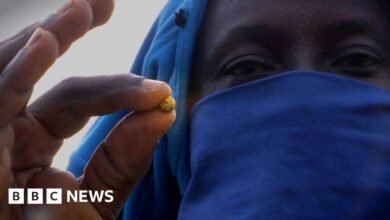Algeria elections: Why voting is a bitter pill for many to swallow

Despite being a doctor who runs his own clinic in Algeria, Adlan does not stop thinking of emigrating to Europe as he doubts that Saturday’s presidential election will usher in a new era of democracy and prosperity in his home country.
“I am bitter and disappointed,” Dr Adlan, who preferred not to give his surname, tells me when I meet him in a cafe in the capital, Algiers.
And yet five years ago his hopes – like those of many other Algerians who were part of the Hirak movement – were high that freedom and democracy were at hand.
A father of two, he regularly participated in a popular uprising that forced Algeria’s longest-serving president, Abdelaziz Bouteflika, to step down after 20 years in power.
“I protested for nearly 50 Fridays in a row. We wanted our voices to be heard, we dreamed of accountability,” Dr Adlan says.
But today, the situation in Algeria is not very different from what has happened in other North African states such as Egypt and Tunisia following the Arab Spring, which was aimed at ending authoritarian rule.
Algeria’s street protests failed to diminish the power of the military, influential since independence and which continues to pull the strings.
President Abdelmadjid Tebboune, 78, is widely seen as being backed by the generals and won elections in 2019 after Mr Bouteflika was forced to step down.
He is expected to easily secure a second term in the poll being contested by two other candidates – Abdelaali Hassani, head of the Movement of Society of Peace, and Youcef Aouchiche, who leads the Front of Socialist Forces.
The election commission disqualified 13 candidates – including Zubaida Assoul, a lawyer and an opposition party leader who took part in the 2019 protests.
Source link



